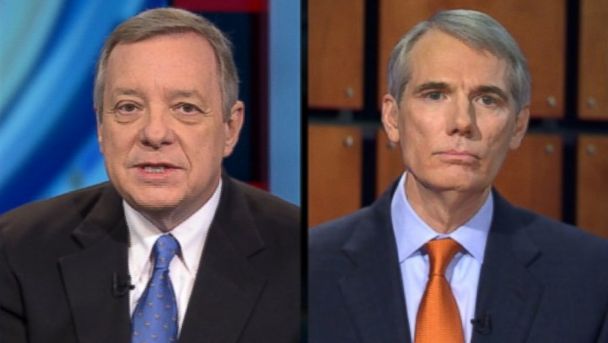Key Senators 'Hopeful' on Budget Deal By End of Week
As Congress heads into its final week before it adjourns for the holidays, Sen. Rob Portman, R-Ohio, said he is "hopeful" a short-term budget deal will be reached to avoid the threat of a potential government shutdown in January.
"I'm hopeful that even by the end of this week we'll be able to come together and achieve that," Portman told George Stephanopoulos on "This Week" Sunday.
"The key is that we not have another government shutdown, that we do keep the spending caps in place, that we don't raise taxes at a time when the economy is still weak," added Portman, who is a member of the joint committee negotiating the deal. "And I think we can accomplish that over the next couple of days."
Despite House Democratic Leader Nancy Pelosi insisting earlier this week that an extension of the jobless benefits program for over one million long-term unemployed, set to expire at the end of the year, was a crucial component of any budget agreement, Sen. Dick Durbin, D-Ill., said the issue wasn't a deal-breaker.
"I don't think we've reached that point where we've said, 'This is it, take it or leave it,'" Durbin said on "This Week." "Negotiations are making progress, moving in the right direction."
But Sen. Durbin said he hopes Congress members negotiating over the budget will heed the words of President Obama's address on income inequality Wednesday, where the president said "the combined trends of increased inequality and decreasing mobility pose a fundamental threat to the American Dream, our way of life, and what we stand for around the globe."
"I certainly hope as part of it that the negotiators will take to heart what the president had to say," Durbin said. "We've got to protect and preserve the safety net in America and give these working families a fighting chance."

ABC News
On Thursday fast-food workers around the country joined protests calling for a $15 an hour minimum wage, arguing that the current federal rate of $7.25 is not enough to live on.
Durbin noted that raising the minimum wage used to be have bipartisan support on Capitol Hill.
"There was a time when raising the minimum wage was a bipartisan issue. And we did it regularly to protect those hardworking Americans who couldn't keep up with the expenses of life. Now it's become a partisan issue," Durbin said. "We've got to have a bipartisan consensus that people who go to work every day and want to go to work every day get a helping hand so they don't have to live paycheck to paycheck."
Portman, however, said is concerned that a higher minimum wage might lead to fewer jobs, reversing employment gains seen in the latest job report this week.
"We're very concerned about jobs, that's the key right now, how to get people to work," Portman said. "What you don't want to do is raise the minimum wage to the point that you're actually losing jobs."
Durbin, who has co-sponsored legislation raising the minimum wage to $10.10 per hour, disputed that concern, saying, "facts and statistics do not back it up." And he added that that there was more to fighting income inequality than just raising wages.
"It's making sure, through the Affordable Care Act, that working Americans have access to affordable health insurance," Durbin said. "It's the Earned Income Tax Credit that was created under President Ronald Reagan, a Republican."
Like "This Week" on Facebook. You can also follow the show on Twitter.
Check out what time "This Week" airs in your area.